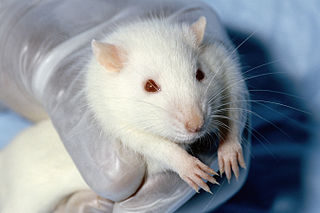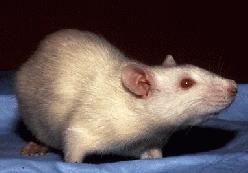
Animal testing, also known as animal experimentation, animal research and in vivo testing, is the use of non-human animals in experiments that seek to control the variables that affect the behavior or biological system under study. This approach can be contrasted with field studies in which animals are observed in their natural environments or habitats. Experimental research with animals is usually conducted in universities, medical schools, pharmaceutical companies, defense establishments and commercial facilities that provide animal-testing services to industry. The focus of animal testing varies on a continuum from pure research, focusing on developing fundamental knowledge of an organism, to applied research, which may focus on answering some question of great practical importance, such as finding a cure for a disease. Examples of applied research include testing disease treatments, breeding, defense research and toxicology, including cosmetics testing. In education, animal testing is sometimes a component of biology or psychology courses. The practice is regulated to varying degrees in different countries.

Cholangiocarcinoma, also known as bile duct cancer, is a type of cancer that forms in the bile ducts. Symptoms of cholangiocarcinoma may include abdominal pain, yellowish skin, weight loss, generalized itching, and fever. Light colored stool or dark urine may also occur. Other biliary tract cancers include gallbladder cancer and cancer of the ampulla of Vater.

Squalene is an organic compound. With the formula (C5H8)6, it is a triterpene. It is a colourless oil although impure samples appear yellow. It was originally obtained from shark liver oil (hence its name, as Squalus is a genus of sharks). All plants and animals produce squalene as a biochemical intermediate. An estimated 12% of bodily squalene in humans comes from the sebum. Squalene has a role in topical skin lubrication and protection.
Polyclonal antibodies (pAbs) are antibodies that are secreted by different B cell lineages within the body. They are a collection of immunoglobulin molecules that react against a specific antigen, each identifying a different epitope.

Linalool refers to two enantiomers of a naturally occurring terpene alcohol found in many flowers and spice plants. Linalool has multiple commercial applications, the majority of which are based on its pleasant scent. A colorless oil, linalool is classified as an acyclic monoterpenoid. In plants, it is a metabolite, a volatile oil component, an antimicrobial agent, and an aroma compound. Linalool has uses in manufacturing of soaps, fragrances, food additives as flavors, household products, and insecticides.
An immunogen is a substance that induces immune response. All immunogens are antigens, and the term antigen arises from its ability to induce generation of antibodies. All antigens are recognized by specific lymphocytes or by antibodies, but not every antigen can evoke an immune response. Those antigens that are capable of inducing an immune response are said to be immunogenic and are called immunogens.

A laboratory rat or lab rat is a brown rat of the subspecies Rattus norvegicus domestica which is bred and kept for scientific research. While less commonly used for research than mice, rats have served as an important animal model for research in psychology and biomedical science.
Adjuvant therapy, also known as adjunct therapy, and adjuvant care, is therapy that is given in addition to the primary or initial therapy to maximize its effectiveness. The surgeries and complex treatment regimens used in cancer therapy have led the term to be used mainly to describe adjuvant cancer treatments. An example of such adjuvant therapy is the additional treatment usually given after surgery where all detectable disease has been removed, but where there remains a statistical risk of relapse due to the presence of undetected disease. If known disease is left behind following surgery, then further treatment is not technically adjuvant.
Experimental autoimmune encephalomyelitis, sometimes experimental allergic encephalomyelitis (EAE) is an animal model of brain inflammation. It is an inflammatory demyelinating disease of the central nervous system (CNS). It is mostly used with rodents and is widely studied as an animal model of the human CNS demyelinating diseases, including multiple sclerosis (MS) and acute disseminated encephalomyelitis (ADEM). EAE is also the prototype for T-cell-mediated autoimmune disease in general.
Non-obese diabetic or NOD mice, like biobreeding rats, are used as an animal model for type 1 diabetes. Diabetes develops in NOD mice as a result of insulitis, a leukocytic infiltrate of the pancreatic islets. The onset of diabetes is associated with a moderate glycosuria and a non-fasting hyperglycemia. It is recommended to monitor for development of glycosuria from 10 weeks of age; this can be carried out using urine glucose dipsticks. NOD mice will develop spontaneous diabetes when left in a sterile environment. The incidence of spontaneous diabetes in the NOD mouse is 60–80% in females and 20–30% in males. Onset of diabetes also varies between males and females: commonly, onset is delayed in males by several weeks.
Bacteria are economically important as these microorganisms are used by humans for many purposes. The beneficial uses of bacteria include the production of traditional foods such as yogurt, cheese, and vinegar. Microbes are also important in agriculture for the compost and fertilizer production. Bacteria are used in genetic engineering and genetic changes.
Titermax is a mixture of compounds used in antibody generation and vaccination to stimulate the immune system to recognise an antigen given together with the mixture. Titermax is a developed immune adjuvant.
In immunology, an adjuvant is a substance that increases or modulates the immune response to a vaccine. The word "adjuvant" comes from the Latin word adiuvare, meaning to help or aid. "An immunologic adjuvant is defined as any substance that acts to accelerate, prolong, or enhance antigen-specific immune responses when used in combination with specific vaccine antigens."
Biobreeding rat also known as the BB or BBDP rat is an inbred laboratory rat strain that spontaneously develops autoimmune Type 1 Diabetes. Like the NOD mice, BB rats are used as an animal model for Type 1 diabetes. The strain re-capitulates many of the features of human type 1 diabetes, and has contributed greatly to the research of T1D pathogenesis.

Cetyl myristoleate is a chemical compound which is a type of fatty acid ester or, more specifically, a cetylated fatty acid (CFA). It is the cetyl ester of myristoleic acid. Preclinical and clinical data show potential benefits in the management of arthritis and fibromylagia.
Freund's adjuvant is a solution of antigen emulsified in mineral oil and used as an immunopotentiator (booster). The complete form, Freund's Complete Adjuvant is composed of inactivated and dried mycobacteria, whereas the incomplete form lacks the mycobacterial components. It is named after Jules T. Freund.
PfSPZ Vaccine is a candidate malaria vaccine made of non-replicating irradiated whole sporozoites and developed by Sanaria. PfSPZ is the acronym of words: Plasmodium falciparum (Pf) and sporozoites (SPZ). Clinical trials have been promising, but it has been subject to some criticism regarding its ultimate feasibility with regard to large-scale production and delivery in Africa, since it must be stored in liquid nitrogen.

Pain in cephalopods is a contentious issue. Pain is a complex mental state, with a distinct perceptual quality but also associated with suffering, which is an emotional state. Because of this complexity, the presence of pain in non-human animals, or another human for that matter, cannot be determined unambiguously using observational methods, but the conclusion that animals experience pain is often inferred on the basis of likely presence of phenomenal consciousness which is deduced from comparative brain physiology as well as physical and behavioural reactions.
The mouse ear swelling test is a toxicological test that aims to mimic human skin reactions to chemicals. It avoids post-mortem examination of tested animals.
Garlic oil is the volatile oil derived from garlic. It is usually prepared using steam distillation, and can also be produced via distillation using ether. It is used in cooking and as a seasoning, a nutritional supplement, and also as an insecticide.






